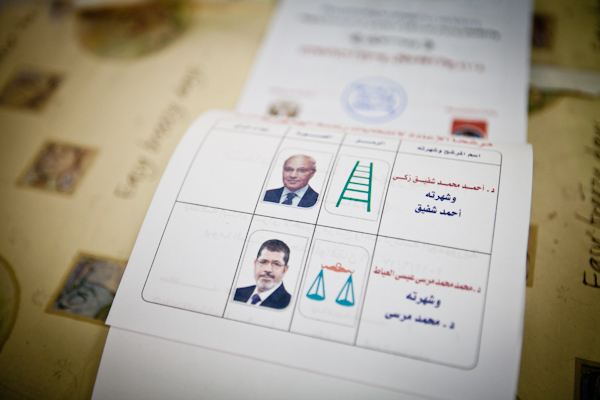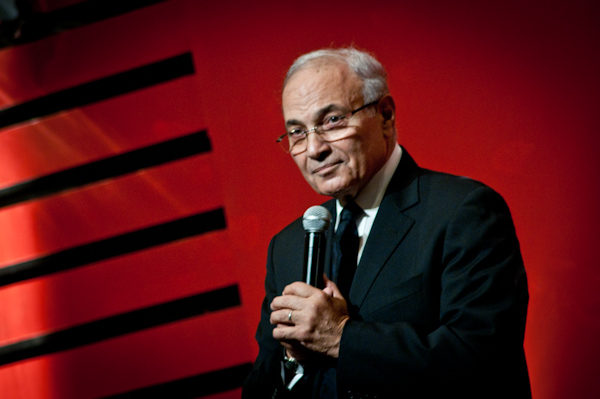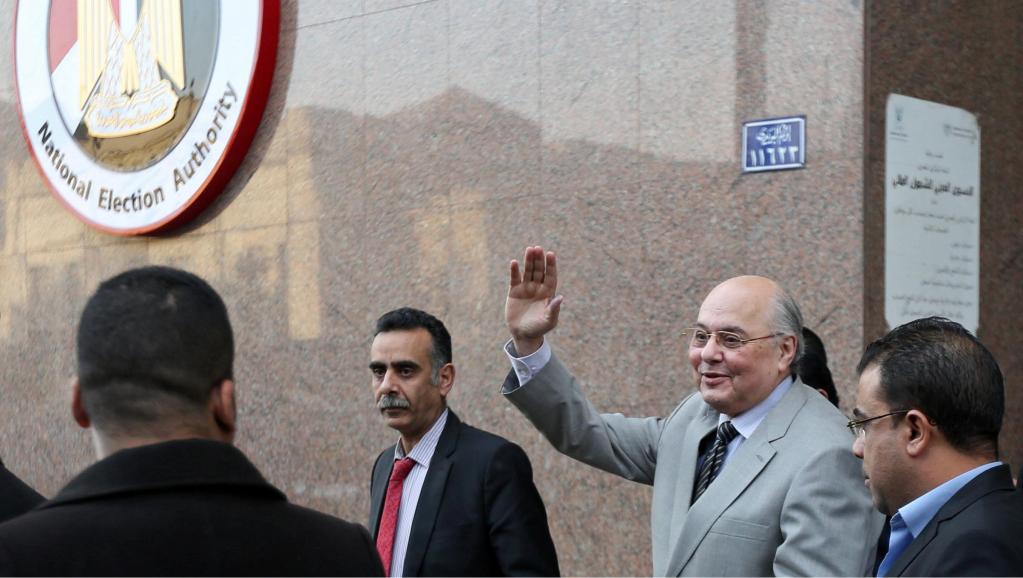
The last round of Egypt’s presidential elections kicked off Saturday amid speculations that the results may deal the last blow to the January 25 revolution and tighten the grip of the military junta on the helm of state.
Nearly 14,000 polling centers opened their gates at 8 am to millions of Egyptians, who had to choose between the Muslim Brotherhood’s Mohamed Morsy and Hosni Mubarak’s last prime minister and a former commander of Egypt’s Air Forces Ahmed Shafiq.
Each had garnered almost one quarter of more than 23 million votes in last month’s first round. While Morsy’s qualification for the run-off came as no surprise given his organization’s robust electoral machine, the ascent of Mubarak's aide on the heel of a sweeping revolution was unexpected by many.
The results provoked thousands to take to the streets to demand the enforcement of the Political Isolation Law on the ex-general. The law, passed by the Parliament in April, bars Mubarak regime high officials from running for prominent government posts. However, the Presidential Elections Commission refused to apply it on Shafiq, and referred it to the Supreme Constitutional Court arguing it might be unconstitutional.
On Thursday, the SCC dashed hopes that it might exclude Shafiq by ruling that the law is unconstitutional. Not only that, the court also handed down another verdict that dissolved the first post-Mubarak elected Parliament and returned legislative powers to the ruling generals.
The verdicts were widely seen as a milestone of a military-orchestrated coup. Saif Eddin Abdel Fattah, a political science professor with Cairo University, told Egypt Independent that these verdicts indicate that the generals have no intention to hand power over to civilians and that they will ensure the victory of their handpicked candidate, Shafiq.
Several pundits have called on the Muslim Brotherhood to pull out Morsy, arguing that they should not “bestow legitimacy”on a poll that they expect to be manipulated in order to bring Shafiq to power and reinforce the military's control.
However, the Brothers turned a deaf ear to these calls, holding that their victory was guaranteed.
In the meantime, some revolutionary groups have called for boycotting the poll or invalidating votes. They hold that neither candidate would serve the revolution.
Although the Brothers played a pivotal role during the 18-day-uprising, their policies during the transitional period have been criticized by revolutionary groups and secular political
forces as serving their own interests and desire for power primarily.
Voters parting ways
"A vote for Shafiq is a slap on the face of the martyrs, a vote for Morsy is a death sentence for the country. How can I vote?" 24-year-old Omar Abdel Aziz told Egypt Independent
However, some people decided to choose what they believed was the lesser of two evils.
“Either way, we were not that pleased with the final two choices," Samar Mohamed, a 19-year-old voter, told Egypt Independent as she walked out of a Cairo polling station with her mother. "But we felt it was our duty to participate and vote."
Mohamed had voted for Hamdeen Sabbahi, a Nasserist political leader who came third in the first round.
"Sabbahi was one of us, he identified with poor people," she said. "We hope Shafiq, who has a lot of experience, will do this and won't be like the old regime.”
“We didn't choose Morsy because the Muslim Brotherhood did not do anything in Parliament,”added Mohamed, who studies business at Cairo University.
The Muslim Brotherhood’s Freedom and Justice Party stood as the largest bloc in the recently-dissolved Parliament and bore all the criticism for the failure of lawmakers to address the country's urgent problems.
The disillusionment with the FJP-dominated People's Assembly explains the decline of the Muslim Brotherhood's share of votes from more than 40 percent in the legislative elections to hardly 25 percent in the first round of the presidential poll.
In the meantime, Shafiq has banked on a discourse that pledged to fix lax security, step up economic growth and reverse political instability that ensued after the revolution.
However, not all voters are disenchanted with the Brothers.
"You can't say FJP hasn't done anything positive in the past months — look at what they have been up against,”said Islam, a voter who declined to reveal his last name.
“The state is working against them and pushing for a Shafiq win, which would kill the revolution," said Islam, who was about to walk into a polling station and cast his ballot in Morsy's favor.
Justice Hatem Bagato, the Presidential Elections Commission Secretary General, said earlier today that the turnout is "less than expected". Some observes noted that less voters had shown up on the first day of the runoff compared to the first day of the first round. In May's poll, the commission announced the turnout was 46.4 percent.
The voting process is set to end on Sunday evening and the final results are to be officially announced on 21 June. The next president is expected to be sworn-in before a constitution laying out his exact authorities vis-a-vis other branches of government is passed.
The future of the next president
According to Saad Hagras, managing editorof Al-Alam Al-Youm newspaper, the next president will rise as “a lame duck”no matter whois announced victorious.
“The next president, whether Morsy or Shafiq, will rise to power in light of the absence of state institutions: there is no Parliament, no constitution….The only existing state institutions are the military, the police and the judiciary,”said Hagras.
Like many observers, Hagras believes Shafiq would have better relations with these institutions by virtue of his belongings to the military establishment.
“For Morsy, the matter will be very difficult. The Brotherhood has burned bridges with all three institutions and with the media and the bureaucracy,”said Hagras adding that the group's alleged attempts to Islamize the state had already antagonized these institutions.
"The dismantling and rebuilding of [state institutions] that the Brothers want has terrified people,”Hagras said.
Only two days before the SCC verdict, the Parliament had elected the 100-member Constituent Assembly tasked with writing the constitution. With the dissolution of the Parliament, the future of this assembly and the new constitution remains uncertain.
A few hours after the verdict, the military-appointed Advisory Council recommended that the generals issue a decree with the criteria of a new constituent assembly. In this case, the generals are set to have the upper hand over the make-up of the assembly and the content of the constitution.
"The president's authorities will be determined according to the winner," said Nabil Abdel Fattah, a political analyst with Al-Ahram Center for Political and Strategic Studies. "If it is Morsy, the president will have partial authorities and will be under pressures from the deep state."
By "deep state", Abdel Fattah refers to the military, the intelligence and some departments in the bureaucracy.
If Shafiq is the winner, the president will have wider authorities in the new constitution, but he won't be able to exercise them without the approval of the generals, argued Abdel Fattah.
"The SCAF will maintain its influence on the executive and all state matters," concluded Abdel Fattah.
For Hagras, a second wave of the revolution looms on the horizon regardless of the winner's name.
“Both will reproduce the reasons that led to the revolution,”said Hagras. “Shafiq will strive to reproduce Mubarak’s regime. As for Morsy, he will reproduce an even older regime, which is the Islamic caliphate. Both belong to the past.”
Additional reporting by Nadine Marroushi and Ali Abdel Mohsen



